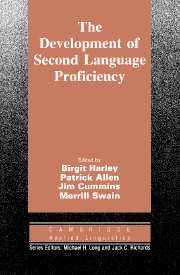Book contents
- Frontmatter
- Contents
- List of contributors
- Series editors' preface
- Acknowledgments
- Introduction
- I THE NATURE OF LANGUAGE PROFICIENCY
- II CLASSROOM TREATMENT
- III SOCIAL AND INDIVIDUAL VARIABLES
- IV PRACTICAL AND POLICY IMPLICATIONS
- Chapter 14 The complementary roles of researchers and practitioners in second language education
- Chapter 15 Educational language policies in Utopia
- V THIRTY-FIVE YEARS OF RESEARCH ON BILINGUALISM
- CONCLUSION
- References
- Author Index
- Subject Index
Chapter 15 - Educational language policies in Utopia
Published online by Cambridge University Press: 05 October 2012
- Frontmatter
- Contents
- List of contributors
- Series editors' preface
- Acknowledgments
- Introduction
- I THE NATURE OF LANGUAGE PROFICIENCY
- II CLASSROOM TREATMENT
- III SOCIAL AND INDIVIDUAL VARIABLES
- IV PRACTICAL AND POLICY IMPLICATIONS
- Chapter 14 The complementary roles of researchers and practitioners in second language education
- Chapter 15 Educational language policies in Utopia
- V THIRTY-FIVE YEARS OF RESEARCH ON BILINGUALISM
- CONCLUSION
- References
- Author Index
- Subject Index
Summary
This chapter explores the range of policies and their implications for language teaching (developing bilingual proficiency) that reasonably seem to follow from the data, findings, and discussions in all the DBP reports, including the second-year report (Allen et al. 1983) and the three-volume final report: Volume I, The Nature of Language Proficiency; Volume II, Classroom Treatment; and Volume HI, Social Context and Age (Harley et al. 1987).
In what follows, two of the major factors in considering research on bilingual education are ignored. The first concerns the theoretical perspective on which the research is based. In an earlier discussion of the immersion programs research, I concluded (with a conflict theory bias) that “unless we try in some way to account for the socio-historical, cultural, and economic-political factors which lead to certain forms of bilingual education, we will never understand the consequences of that education” (Paulston 1980:33). Here I have chosen to ignore all these factors and have indeed considered instruction and school programs as the independent variables in trying to understand the consequences of the various programs. A caveat in passing, however: We have to be extremely cautious in drawing generalizations based on a sample of middle-class children with IQs around 115–117 (Harley et al. 1987, Vol. 111:223) who are in voluntary programs. Although we would not expect any reputable scholar to recommend it, we should be concerned about those who advocate importing the immersion program model for minority bilingual education in the United States.
- Type
- Chapter
- Information
- The Development of Second Language Proficiency , pp. 187 - 198Publisher: Cambridge University PressPrint publication year: 1990
- 2
- Cited by



